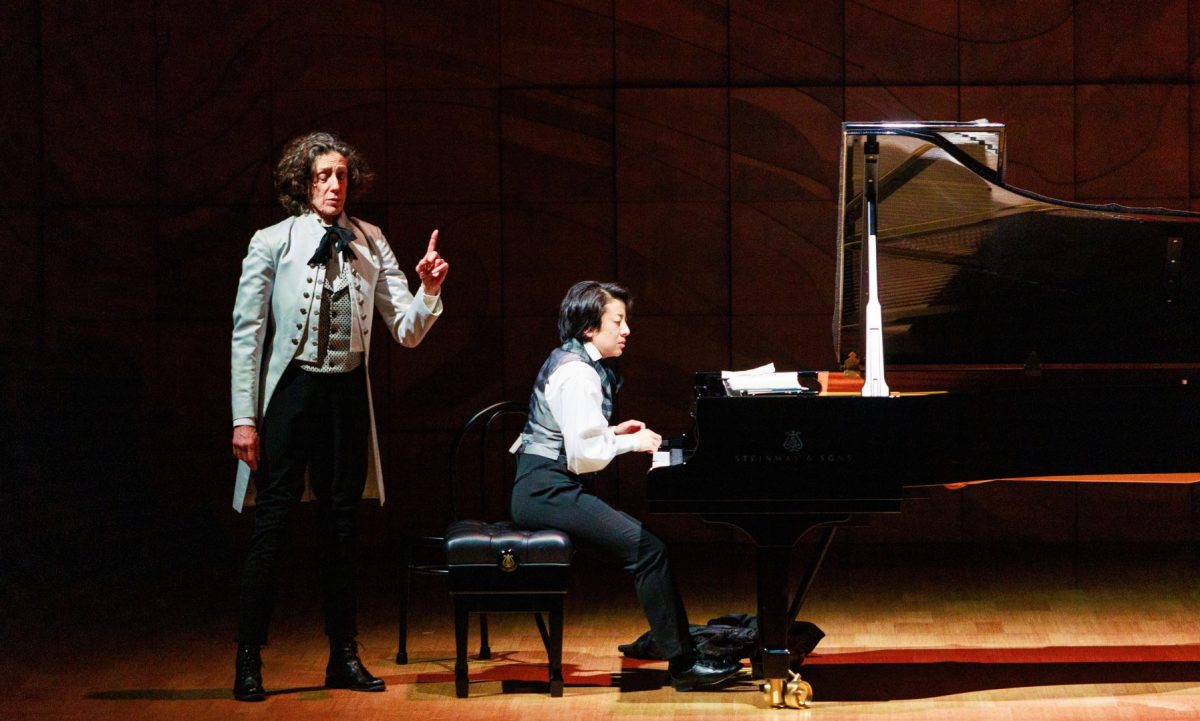Chopin’s Piano, currently touring Australia, poses an intriguing question: what can the history of one particular instrument tell us about how music – its composition and sound, performance and reception – changes over time? This was the subject of musician and scholar Paul Kildea’s 2018 book of the same name, a book that traced the extraordinary fate of a pianino (a precursor of the modern piano) played by Polish-born composer Frédéric Chopin.
Kildea, now Artistic Director of Musica Viva Australia, has adapted the book for stage with director Richard Pyros. Blending music and theatre, and featuring pianist Aura Go and actor Jennifer Vuletic, it prompts us to reconsider how we play and listen to music.
Chopin himself favoured the pianos produced by French company Pleyel et Cie, known for their clarity of sound and responsive touch. Kildea’s focus is on the more rudimentary specimen constructed by craftsman Juan Bauza on the island of Majorca, where Chopin moved in 1838 with French writer George Sand and her children, as the couple tried to evade the Parisian spotlight. There, on this small, upright instrument of limited range, he completed Opus 28, a set of 24 brief preludes that upended the form and cemented his reputation.
But what of the pianino’s afterlife? Acquired in 1913 by Polish-born musician Wanda Landowska, it accompanied her to Paris, but was abandoned when the German occupation forced her to flee to the US in 1940. The pianino was then seized as the Nazi regime sought to appropriate Chopin as their own, and was ostensibly returned to Landowska in 1946. Yet, Landowska herself never returned to France and the pianino disappeared, its whereabouts still unknown.
Vuletic and Go take on the characters (and accents) of Sand and Chopin, Landowska and her husband, and the many others who tell the instrument’s story. The play is interspersed with Go’s rendering of the 24 preludes. Usually performed as a cycle, the preludes serve here as a reflection upon the contexts that shaped the life and music of both Chopin and Landowska, an approach that subtly prods Chopin’s association with Romanticism while allowing space to absorb the musical ideas explored in each piece.
However, the surrounding script is less successful. At some points overblown or heavy on exposition (especially where it cleaves closely to Kildea’s text), at others providing insufficient context for those unfamiliar with the book, it would benefit from further development.
The performances, though, are a revelation. Vuletic, who takes on multiple characters, lopes and prowls about the stage, her exaggerated physicality heightened by the show’s clever staging and lighting. Go, meanwhile, may be new to acting but inhabits her roles with an ease made all the more impressive by her ability to slip in and out of performance at the keyboard without missing a beat. Her playing moreover possesses a lightness and colour that recalls pianists like the Lithuanian-born American Nadia Reisenberg (1904-83), a welcome departure from the keyboard hammering and ostentatious emoting too often seen in competition and YouTube renditions of the preludes.
Read: Performance review: City of Angels, Hayes Theatre
Reuniting Chopin with his instrument in this way prompts us to think about the contexts of creativity, the happenstance of memory and preservation, and their legacies for our shared musical heritage. If theatres and concert halls are to lure audiences from their screens, this type of cross-genre storytelling is certainly one way to try it. Yet this is also a story that, conversely, deserves a larger audience. COVID-19 may have stalled plans for its film adaptation, but Chopin’s Piano is surely an international television series in the making.
Chopin’s Piano presented by Musica Viva Australia
Piano: Aura Go
Actor: Jennifer Vuletic
Director: Richard Pyros
Lighting Designer: Richard Vabre
Costume and Props Designer: Christina Smith
Sound Designer: Kelly Ryall
Associate Lighting Designer: Martin Shlansky
Stage Manager: Rebecca Poulter
Language Coach: Geraldine Cook-Dafner
Chopin’s Piano is touring Australia until 26 July.
This review is published under the Amplify Collective, an initiative supported by The Walkley Foundation and made possible through funding from the Meta Australian News Fund.





